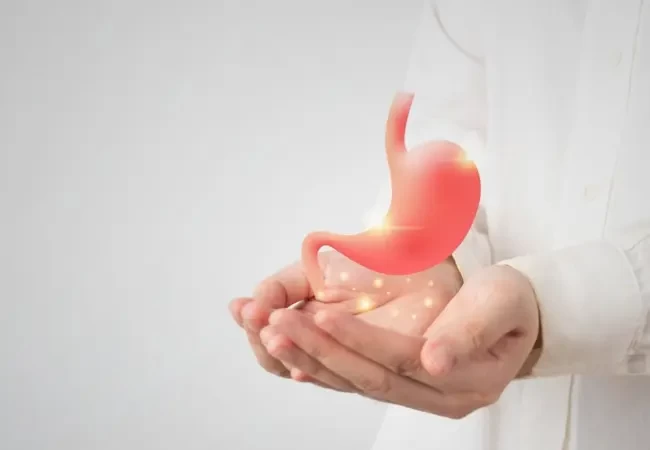Hormones and weight gain are interrelated with each other. Hormones are chemicals that control how our body works and they can cause weight gain. Hormones like leptin, insulin, sex hormones, growth hormone, etc. affect how hungry you feel, how fast you burn calories, and where you store fat. People who are overweight often have hormone levels that make them store more fat. Your body has glands that release hormones into the blood. This system is called the endocrine system which works with the brain and immune system to help you handle stress and different situations. Too much or too little of certain hormones can cause weight gain and being overweight can change hormone levels too.
Leptin is a hormone made by fat cells and released into the blood. It lowers your appetite by telling the brain to eat less and helps control body fat. People who are overweight have more leptin because they have more fat. But even with high levels of leptin, they do not feel full during and after meals because their bodies do not respond properly to it. Scientists are studying why leptin's signals do not reach the brain in overweight people.
Insulin is a hormone made by the pancreas that helps control your sugar and fat in your bodies. It moves sugar from the blood into muscles, the liver and fat tissues so that you can have energy and keep blood sugar levels normal. In overweight people, insulin does not work as well and tissues cannot control blood sugar levels. This can cause type II diabetes and metabolic syndrome.
Where body fat is stored affects health issues like heart disease, stroke and arthritis. Fat around the belly is more dangerous than fat on the hips, thighs, or bottom. Hormones like estrogen and androgens decide where fat goes.
Before menopause, women make estrogen in their ovaries which helps with ovulation. Men and postmenopausal women make less estrogen in their fat tissue. Young men have high androgen levels from their testes which decrease with age.
Changes in hormone levels as people age change how fat is stored. Young women usually store fat in their lower body (pear-shaped) but old men and postmenopausal women store more fat around their belly (apple-shaped). Postmenopausal women on estrogen supplements do not get as much belly fat. Studies in animals show that lack of estrogen can cause weight gain.
The pituitary gland in your brain makes growth hormone which helps you grow taller and build bones and muscles. It also affects how fast you burn energy. Researchers found that overweight people have lower growth hormone levels than those with normal weight.
Ghrelin is the hunger hormone which is opposite of leptin. It will tell your brain when your stomach is empty and you need food which makes you feel hungry. Normally, ghrelin levels are highest before eating and lowest after a meal. Interestingly, people with obesity have low ghrelin levels but are more sensitive to it which might cause overeating.
Cortisol which is known as the stress hormone is made by your adrenal glands. During stress, it raises your heart rate and energy levels which create a "fight or flight" response. While cortisol is helpful in dangerous situations, too much over time can cause health problems like heart disease, diabetes, low energy, high blood pressure, sleep problems and weight gain. Poor sleep, constant stress and eating lots of sugary foods can increase cortisol levels. Obesity also raises cortisol which will lead to more weight gain and create a harmful cycle.
Balancing hormones for weight loss or weight management is important. You can follow the below given instructions to manage your hormones and weight loss.
Understanding the connection between hormones and weight gain is crucial to stay healthy. Hormones can influence whether you gain or lose weight but your genes also matter. To manage your weight, focus on a balanced diet with healthy foods, exercise regularly, handle stress well, and get 7 to 9 hours of good sleep each night as given above. This approach will help you balance hormones and support your weight goals. By taking care of these areas, you can work towards a healthy weight and better overall wellbeing.
EMC. the best hospital in Kochi, is the right place where you can get correct advice regarding your hormone balancing and weight management. Our Department of Nutrition and Dietetics will offer you complete nutrition care. This includes assessing needs, creating diet plans, and following up with patients. Led by top dietitians in Ernakulam, the department helps both acute and chronic patients with their nutrition. They make custom diet plans and schedule appointments for those needing diet changes as advised by their doctors. This way, you can manage your hormones and weight properly.


Discover the truth behind common plastic surgery myths. Learn what's real, what's outdated, and how modern procedures truly work.

A step-by-step overview of GI surgery, covering what to do before surgery, what happens in the OR, and how to ensure a strong recovery.

Learn about cancer, its early signs, and prevention tips to lower your risk. Early detection saves lives—stay informed, take proactive steps, and protect your health.

Discover why a skilled pediatrician is essential for your child's growth, development, and overall well-being, from infancy through adolescence.

Discover how dermatology can help tackle acne, slow aging, and treat various skin conditions for healthier, more radiant skin.

Discover common childhood allergies, their symptoms, and management tips. Stay informed to keep your child safe and healthy.

Your liver plays a vital role in metabolism, digestion, immunity, and detoxification. Learn how liver health affects your body and ways to maintain its function.

Strong bones support your body and protect your health. Discover simple diet, exercise, and lifestyle tips to maintain bone strength at any age.

Discover the symptoms, causes, and treatment of hypertensive heart disease. Learn how high blood pressure affects your heart and when to seek medical care.

Learn about chest pain symptoms, causes, and treatments. Know when to seek medical help for a healthier heart.